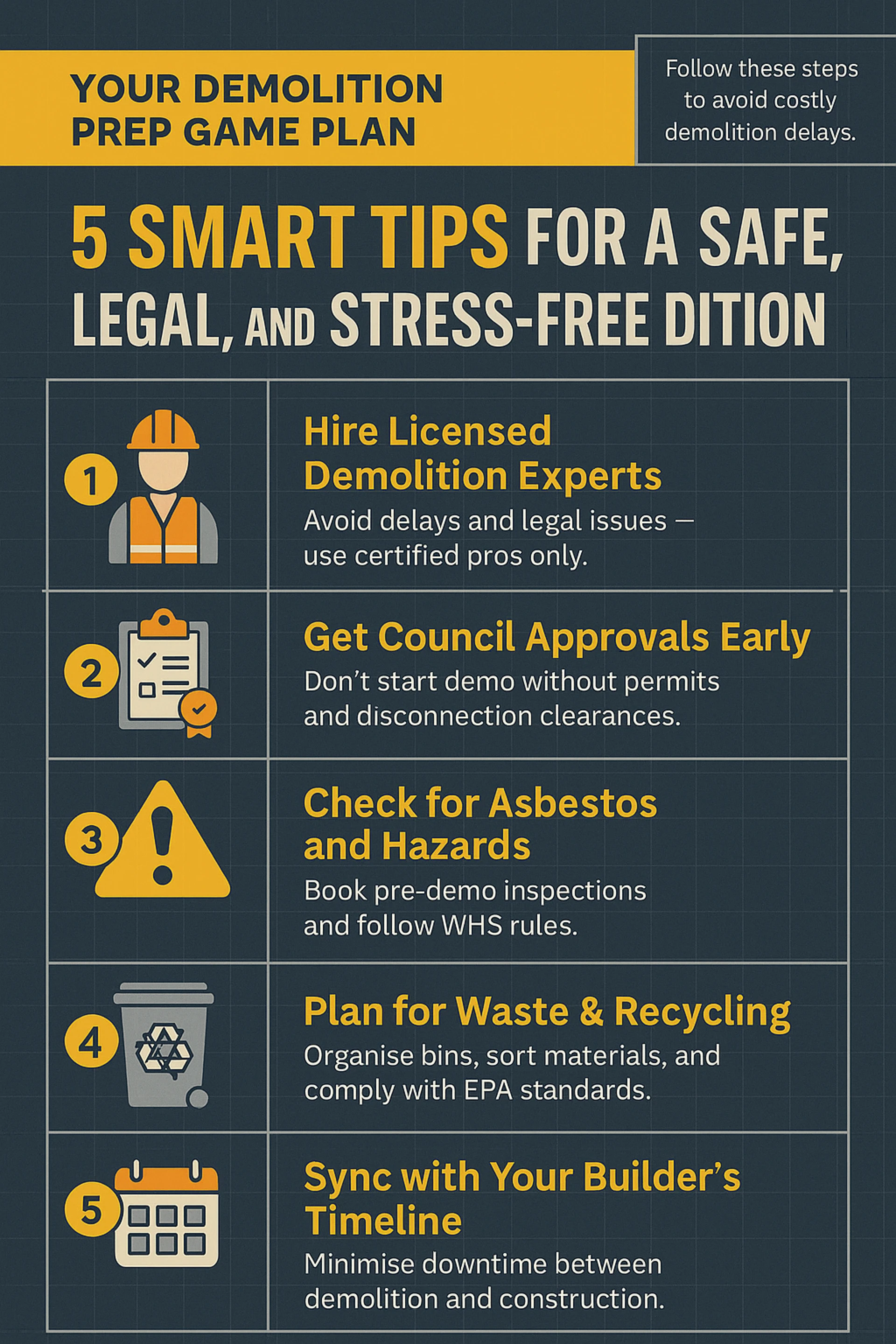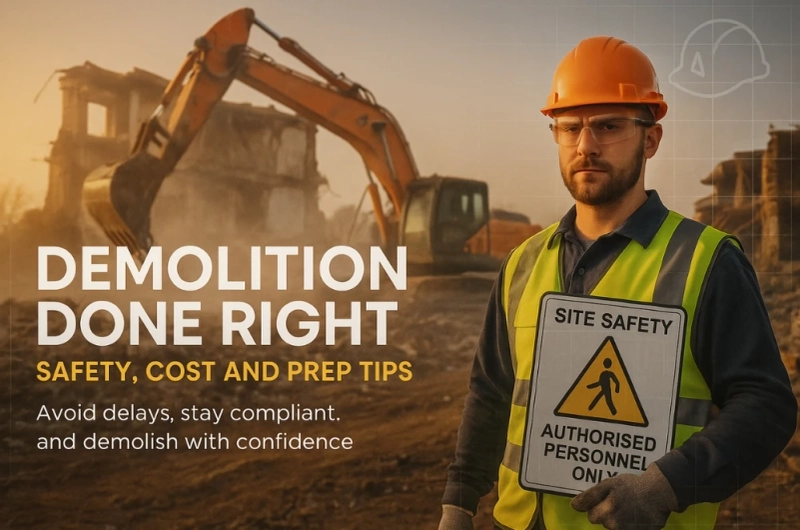When planning any structural teardown, whether a commercial building or an industrial site, the first step is finding industrial demolition specialists. These professionals are equipped to handle complex demolitions with safety, speed, and regulatory compliance in mind. A demolition project might look straightforward — bring in the excavators and knock it down, right? But there’s far more going on behind the scenes. Every site is different. Regulations shift between council zones. And the type of structure you’re removing dictates everything from the machinery used to the waste disposal process. Whether you’re clearing the way for a new retail space or removing an outdated facility, understanding the process — and who’s best suited to do it — can save you time, money and stress. I remember when I helped coordinate the demolition of an old warehouse for a small logistics client. We thought we could just call in a local crew and get started. Still, the council’s approval process, asbestos inspection, and site clearance protocols turned that assumption on its head. We would’ve been buried under fines and delays without a seasoned contractor. These specialists also manage end-to-end logistics — from applying for council permits to organising skip bins, environmental testing, and traffic management. Their role isn’t just technical, it’s strategic. You want someone who anticipates the red tape before it trips up your project.
What influences demolition costs in Australia?
There’s no single price tag for demolition. Cost factors include:
- Size and structure type: Multi-storey commercial sites need more planning than a small office block.
- Materials involved: Reinforced concrete or asbestos materials increase cost and complexity.
- Access and site location: Tight urban sites often require specialised equipment and transport logistics.
- Regulatory compliance: Permits, utility disconnections, and site testing are often separate line items.
Getting itemised quotes from at least 2–3 contractors is best. Look for a scope of work that includes safety planning, waste removal, and any prep needed for your next phase (e.g., excavation or rebuild). Some demolition companies offer bundled services that include recycling of materials, which can slightly offset the cost. Others charge a premium for after-hours work, noise mitigation, or hard-to-reach locations. Be sure to ask for contingencies — demolition rarely goes exactly as planned.
Safety isn’t optional: Know your legal responsibilities
In Australia, demolition work is governed by specific codes and legal duties. The law places heavy responsibility on contractors and property owners to ensure work is carried out safely. If you're unsure where to begin, the demolition safety regulations thoroughly break down your obligations. These include risk assessments, structural evaluations, site control, and worker protections. Many clients I’ve worked with underestimate how fast a job can go sideways without a proper safety plan. One project stalled for two weeks simply because the skip bin for hazardous waste wasn’t certified for transport — and yes, fines were issued. Even minor oversights, like failing to fence off a public footpath or not displaying warning signage, can result in immediate stop-work orders. Always double-check the contractor's Safe Work Method Statement (SWMS) and ensure it's tailored to your site, not just a generic template.
How to prepare your site for demolition

Preparation is more than clearing the site. Here’s what to have in place before work begins:
- Utility disconnection letters: Confirm that gas, water and power are shut off and certified.
- Hazardous material reports: Especially important for buildings built before 1990.
- Traffic and public safety plans: These are required in most council permit approvals.
- Clear site access: Make room for heavy equipment and debris trucks.
Depending on your demolition type, you may also need tree removal permissions or noise mitigation measures. If you're unsure about compliance in your area, it’s worth reviewing your council’s local demolition regulations to understand what might delay or impact your project.
Timing your demolition for success
Demolition isn’t just about removing a structure — it’s about clearing the way for what’s next. That means timing matters.
Here’s how to align your demolition with your broader project:
- Coordinate with builders: Avoid long gaps between demolition and construction.
- Apply for rebuild permits early: Some councils won’t process them until the demo is complete.
- Plan for site cleanup: Leftover debris can delay new work.
A project I worked on in Wetherill Park stalled for nearly a month because the demolition crew hadn’t included soil remediation. We waited for third-party specialists, which blew out our rebuild timeline. Also, consider seasonal factors. Wet weather can delay access to heavy machinery, and extreme heat may trigger safety shutdowns. Planning during milder months can improve both speed and crew availability.
Don't forget asbestos: A hidden risk
Many older commercial buildings contain hidden asbestos in walls, ceilings, and insulation. Even partial demolition can release toxic fibres into the air, a serious risk for workers and nearby residents. For those facing this issue, it’s crucial to understand the steps involved in asbestos removal before demolition, including risk assessments, removal certifications, and disposal regulations. There’s no room for shortcuts here. Even minor fragments of asbestos found post-demolition can trigger expensive cleanups and liability issues, not to mention reputational damage if neighbours are exposed.
Final thoughts: Ask more questions than you think you need to
The best demolitions I’ve seen are the ones where owners took their time asking the right questions:
- Are you licensed and insured for this type of demolition?
- What’s your safety record?
- Can I see example projects or client testimonials?
- How do you handle unexpected delays?
If a contractor brushes off your concerns or avoids written documentation, walk away. Financial, legal, and safety risks aren’t worth it. And remember: a demolition is more than just destruction — it’s a critical transition phase. It sets the stage for your next chapter, whether building a new office, creating open land for resale, or developing new infrastructure. A clean, efficient demolition gives you the clarity and confidence to move forward. So take the time, do your homework, and partner with someone who treats your project like more than just another job. Your land, investment, and reputation are on the line, so don’t let your demolition be an afterthought. It becomes a strategic move, not just a messy necessity, when done right.


